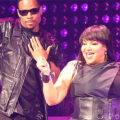“Everybody Dance Now”: Freedom Williams and C+C Music Factory gonna make City Winery sweat
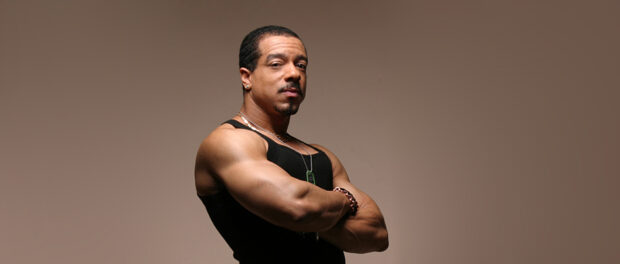 Photo provided by City Winery
Photo provided by City Winery
Not a moment went by in the early 1990s when something off C+C Music Factory’s dynamite debut album, “Gonna Make You Sweat,” wasn’t blaring from the radio, practically any club, a sports stadium or mega movies such as “Sister Act” and “Buffy The Vampire Slayer.”
And thanks to ongoing soundtrack slots, samples, steaming and shows led by original singer/rapper Freedom Williams, including a giant one alongside Tone Loc slated for the City Winery on Saturday, May 20, the group’s cross-cultural ubiquity never really wavered.
Chicago Concert Reviews reached Williams while the New York native was taking a post-workout walk, during which he got greeted at least five times, but always took a moment to converse and never lost track of an interview that ranged from getting started as an all-star studio engineer, to a revolutionary body of work seamlessly split between pop, rock, R&B, house and hip-hop.
What’s in store for the City Winery?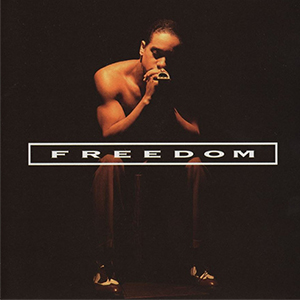
Freedom Williams: We do the hits man. We have fun. My DJ, my singer, we jam, we rock, 35, 45, 55 minutes, whatever, and we just have a blast man. Chicago’s that toddlin’ town. Chicago is the bomb…The first show I ever did in the ‘80s was in Chicago. I didn’t know it was that cold man! I had a T-shirt on. Chicago’s a big music town man. It’s a big town for a lot of history, a lot of culture, “The Untouchables,” a lot of gansta history, a lot of political history. The political machine is in Chicago. It’s a serious place man. I think it’s still the second largest city in America…All the shows are the same in every city man…I’m very, very attached to the audience, very in tune with my surroundings…My singer’s really talented, Smooth Jammy is her name [and also] DJ Diamond, so we have a blast man. I’m really fortunate.
Tone Loc is on this show too. What kind of history do you have together?
Williams: Yeah, I’ve known Tone Loc for 30 years man. The first time I saw the video of “Wild Thing,” I was in the studio recording. I used to be an engineer in New York City at Quad and that song came on. I was a big Robert Palmer fan, and when I saw the four girls, I was like “oh snap, it’s like Robert Palmer.” We came out at the same time. He has a heavy guitar part on his song. I have a heavy guitar part on mine. I’ve done a thousand shows with Tone Loc. He’s a real good brother, real good friend of mine.
Who are some of the other artists you’ve crossed paths with on a regular basis?
Williams: Me and Rob Base are very tight. I’ve known Rob Base before we were making records in New York City in the ‘80s. We both trying to make it. He was in Harlem. I was in Brooklyn. I just know a lot. Young MC, Biz Markie just passed away, a lot of other ‘80s cats, DJ Kool. Naughty By Nature, I’ve known them for a while. When they were shopping demos, their cousins lived in the projects in Queens that I grew up in, so I was familiar with them before they were famous. Back in the ‘80s man, New York City, we were all coming out of the tri-state area and so we all had a lot of influence on each other…
Rob Base had a lot of influence on me. When “It Takes Two” came out, I remember walking down Fourth Street and the record was blazing out of the car. I was like “Yo, that’s gonna be a hit.” As a matter of fact, I’m walking down the same block as 1988 when I heard “It Takes Two.” Rest in peace [DJ] E-Z Rock. Yeah, Rob Base, Big Daddy Kane, Nice & Smooth. I’ve been good friends with Smooth B. for years. I consider Rakim to be the greatest emcee of all time. I was a fan of Melle Mel. I became a fan of my heroes, my heroes became my contemporaries, and my contemporaries became my friends, so I’m very fortunate man. It’s hard to make it in the music business. It’s not an easy thing to do and it was actually easier for us in the ‘90s because all you had to do was make a record. Nobody knew what it was in the ‘80s. Nobody knew how to market it. Just make a record, put it out and they were signing everybody. Now it’s different, but that’s pretty much it man. That’s the deal.
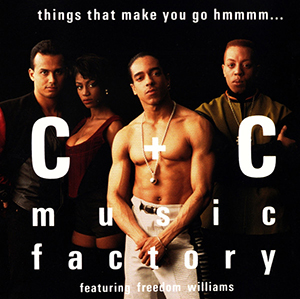 Take us back through the steps of joining C+C Music Factory.
Take us back through the steps of joining C+C Music Factory.
Williams: I was an engineer in the studio. I left college in Virginia, moved back to New York, went to a recording engineering school called CMA [Center For Media And Arts], got out of there and became an intern in the studio for about six months to a year. I would just mix records man. I learned to engineer. That’s how I met the guys in C&C, [David Cole and Robert Clivillés]. I would take the two-inch reels off the machine, all the old Fat Boys records, all the Kurtis Blow records, all the Cameo records and store it in the studio. As an engineer, I worked with Cameo. I worked with Kool & The Gang. I worked with Steve Winwood. I mixed some Bob Marley remixes. I mixed some Michael Jackson records. That’s how I started professionally. I went to school cause I wanted to be a rapper and I wanted to be an emcee, but I was also a DJ and I thought, “I need to learn how to actually make these records.”
How would you describe the enormous period surrounding the smash album, “Gonna Make You Sweat?”
Williams: Yeah, that record was eight times platinum and around the world it went more. I mean, it was a good record man. It was really slated to be my solo record cause I had been producing with these producers [Clivillés and Cole]. We did Seduction and “(You’re My One and Only) True Love.” We did the Brat Pack. That’s when I first started with Chicago. I went to Chicago with Seduction, actually, before my record came out. I used to open for them. I had a record out called “Get Dumb.” So we produced the Seduction album [“Nothing Matters Without Love”]. We produced other albums. We worked with Natalie Cole on “Pink Cadillac.” We worked with different people. Yeah man, that was supposed to be a solo record, but it ended up a record as me featuring and it ended up okay man. I own the trademark, so I can do and tour the way I wanna tour. I’m very, very fortunate…
What was it like for you personally when everything started to really pick up steam?
Williams: Well, I mean you’re young. You’re 25. You’re doing what 25-year-olds do. You’re chasing a**, drinking in the clubs, hanging out. It was just magnified because I had access to all of the things that I ever wanted to do. I didn’t really get high a lot. I used to smoke weed when I was in college and high school, but when I started making records, I kind of dialed all of that back and focused on the dancing, and focused on the stage, just trying to take in the whole entire conceptuality of being an entertainer. Cause remember, we grew up out of the Michael Jackson era, the Prince era, the performance era. Now it’s different because you got dancers like Chris Brown, but most rappers now don’t do as much of that. Hammer was dancing. Heavy D was dancing. I was dancing. Nice & Smooth was dancing. All the guys were dancing cause we came out of that era with MTV. But it was the 25, 26-year-old just traveling the world, getting girls, doing what we did man…We were on tour with Tony! Toni! Toné!, Bell Biv DeVoe, Jody Watley and all these groups.
What do you think caused the “Gonna Make You Sweat” single to endure to this day?
Williams: I think it’s me because of the way that I continue to do the show. I continue to get a lot of shows because my show is good. I tweak my show every three or four months. I go back and I rehearse, add elements, so that keeps it in the public’s eye on stage. The song itself works because it was a combination of techno pop, funk, hip-hop and bebop. It was all those elements put together. You know, I go out there. I’m not superly overweight. I still look kind of the same. You maintain your integrity.
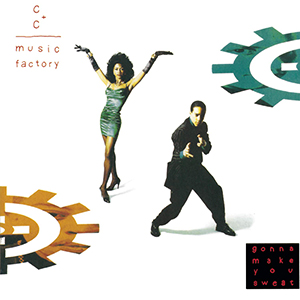 If you look at Mick Jagger, he looks the same as Mick Jagger, just 40 years older. So you maintain your integrity of who you are as an artist, and what you bring to the table, and that kind of transpires. I know guys with records that are as big as that record, but because they don’t take care of themselves, they don’t go to the gym, it doesn’t translate. It’s like an automobile. You’ve gotta keep washing it. You’ve gotta keep cleaning it. It’s like education in life. You have to keep educating yourself. You have to keep the process going as much as you possibly can so that what you created stands the test of time.
If you look at Mick Jagger, he looks the same as Mick Jagger, just 40 years older. So you maintain your integrity of who you are as an artist, and what you bring to the table, and that kind of transpires. I know guys with records that are as big as that record, but because they don’t take care of themselves, they don’t go to the gym, it doesn’t translate. It’s like an automobile. You’ve gotta keep washing it. You’ve gotta keep cleaning it. It’s like education in life. You have to keep educating yourself. You have to keep the process going as much as you possibly can so that what you created stands the test of time.
Can you explain some of the confusion with the female vocalists on that song and how it was eventually sorted out?
Williams: Martha Wash was the one that sung [the female part of] that one song. Zelma [Davis] sung all the other songs on the album. The reason was we didn’t have Zelma in the group at the time and I didn’t necessarily want to tour with Martha because Martha didn’t really want to tour. So we had to go get another girl because Martha had already done The Weather Girls. She’d already done Two Tons O’ Fun. She did the whole Black Box album, [“Dreamland”]. She did the Seduction album for us, the first record. She really wasn’t ready to do that. When you break a new record with a new artist, you’ve gotta go kiss babies, shake hands, go to in-stores, sign autographs and Martha was a 15-year-veteran at that point, so it wasn’t really a big controversy until she decided to sue because Rob and David didn’t want to pay her correctly, but she wasn’t really trying to go on the road and promote the record anyway. She did that one record, then I went and got Zelma for the rest of the album.
Do you ever all get together anymore or are you pretty much running the group now?
Williams: No, no. David died, Robert is retired and Zelma lives in California.
After working with everyone on the debut project, you finally made an official solo album, “Freedom.” What made you want to go that route?
Williams: Because I never really liked Robert and he was in the group. We didn’t get along. And we would break up. Metallica broke up for a while. Boyz II Men split up for a while. Run-DMC split up. But I never really was a big fan of Robert and that record was supposed to be my solo record, the “Gonna Make You Sweat” record, so when we made that record, I decided to go ahead and make my own record, just keep it pushin’ man and just expand your musical boundaries. [When] you’re in a group, it’s like marriages. People get divorced. People don’t always stay together.
In what ways do you feel the music you created rubbed off on today’s pop and hip-hop?
Williams: Everything cycles. Life is just cycles. Whatever was old is always going to be new. The sun is a cycle. The earth is a cycle. Your birthday is a cycle. Astrology is a cycle. It goes round and round, so it will come back. People will discover it again. Young kids will discover it. They might sample it. [“Gonna Make You Sweat”] has been sampled a lot of times because it’s got a really strong pop sound. It’s got some hip-hop elements and it’s got some swagger to it, so it’s always gonna come around. It’s just one of those good, friendly songs you can put in movies. “Everybody Dance Now” is a command. It’s always going to be a kind of song that commands an audience.
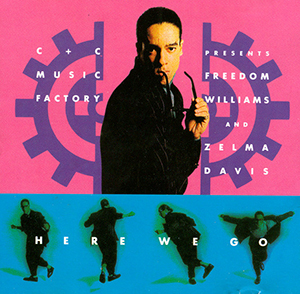 Speaking of movies and TV, what have they added to the equation?
Speaking of movies and TV, what have they added to the equation?
Williams: Yeah, I mean, it works. The songs work. If you’re doing a movie, you need some songs and it might be a dance theme. I remember watching “The King Of Queens” and there was this theme with the comedian. It’s a sitcom and he first met his wife in the club. He was introduced by his friends, and in the background, that song was playing because it was such an iconic song for the early ‘90s.
How do you feel about everything going on in music right now?
Williams: I don’t pay attention to it too deeply. I just pay attention to the music. I don’t really think about the people who do it per se. There’s some good stuff out there. I don’t think about it too deeply. The scene is the scene. The young cats are gonna be creative. They don’t want to sound like us, so they’re gonna come up with new things to do just because they want to be different. Some of it I like. Some of it I don’t like. I don’t listen to a lot of hip-hop. I never listened to a lot of hip-hop. I listen to pop, R&B, jazz, blues. I might listen to Rakim or Run-DMC, or maybe some J. Cole, Kendrick Lamar. I like DaBaby a lot. I think he’s dope. I listen to a lot of jazz, a lot of classic R&B, a lot of ‘70s and ‘80s pop, a lot of Journey. Metallica’s one of my favorite groups of all time…
C+C Music Factory even has the song “Here We Go, Let’s Rock & Roll,” which is as much of a rock song as it is a dance song.
Williams: Yeah. I made a record on my solo album, the “Freedom” album, called “Down.” It’s a straight rock record.
What’s it like for you to blend all of those styles together?
Williams: If you’re an artist, it’s natural. If you’re a true artist, you don’t blend. You just live. Prince does pop. Prince does funk. Prince was doing R&B. Stevie Wonder does reggae. Michael Jackson did rock. He did pop. He did R&B. Madonna does some R&B. It’s just who we are. We’re musicians. We’re not put in a box. We’re the creators of the art form. If I can design a Chevy Nova, I can design a sports car. If I can design a hatchback, I can design a pickup truck. It’s just what we do. If I’m an architect and I can build a school, I can go build a church. If I can build a church, I can build a hotel. If I can build a hotel, I can build the stadium, so it’s not really a box for us. We’re musicians.
What do you hope fans will take away from this current season of C+C Music Factory?
Williams: That we have fun and that we’re still the same, that we can reinvent ourselves. You’re gonna have some fun when you come to our show. I don’t do a lot of talking. I’m here to rock, you know what I mean?
C+C Music Factory and Tone Loc perform at City Winery on Saturday, May 20. For additional details, visit Facebook.com/FreedomWilliamsNY, Facebook.com/ToneLocOfficial and CityWinery.com/Chicago.







